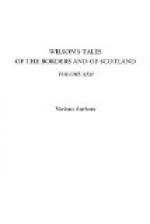Not enough; for legendary details cluster round startling events, and often carry a moral which may prevent a repetition of these; and so, had it not been for this apparently inexplicable death by starvation, our wonderful story might never have gathered listeners round the evening fire. We must go back some twenty years before the date of the said sermon to find a certain merchant-burgess of the city of Edinburgh, David Grierson, occupying a portion of a front land situated in the Canongate, a little to the east of Leith Wynd. It would be sheer affectation in us to pretend that this merchant-burgess had any mental or physical characteristic about him to justify his appearance in a romance, if we except the power he had shown of amassing wealth, of which he had so much that he could boast the possession of more than twenty goodly tenements, some of wood and some of stone, besides shares of ships and bank stock. And no doubt this exception might stand for the thing excepted from, for money, though commonly said to be extraneous, is often so far in its influences intraneous, that it changes the feelings and motives, and enables them to work. And then don’t we know that it is by extraneous things we are mostly led? But however all that may be, certain it is that our merchant-burgess was a great man in his own house in the Canongate, where his family consisted of Rachel Grierson, his natural daughter, by a woman who had been long dead, and Walter Grierson, his legitimate nephew, who had been left an orphan in his early years, and who was his nearest lawful heir. Two servants completed the household; and surely in this rather curious combination there might be, if only circumstances were favourable to their development, elements which might impart interest to a story.
So long as the shadow of the dark angel was, as Time counted, far away from him, Burgess David was comparatively happy; but as he got old and older, he began to realize the condition of the poet—
“Now pleasure will no longer please,
And all the joys of life are
gone;
I ask no more on earth but ease,
To be at peace, and be alone:
I ask in vain the winged powers
That weave man’s destiny
on high;
In vain I ask the golden hours
That o’er my head for
ever fly.”
Then he waxed more and more anxious as to what he was to do with his money. He tried to put away the thought; but the terrible magistra necessitas went round and round him with ever-diminishing circles, clearly indicating a conflict in which he must succumb. He must make a will; an act which it is said no man is ever in a hearty condition to perform, unless mayhap he is angry, and wishes to cut off an ungrateful dog with a shilling; and besides the general disinclination to sign the disposal of so much wealth, of which he was more than ordinarily fond, and to give away, as it were, omnia praeter animam, in the very view of giving away the soul too, he was in a great perplexity




